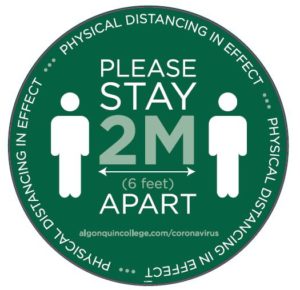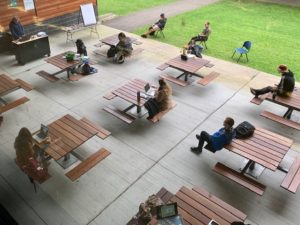A New Virtual Approach to Learning at Algonquin College’s Pembroke Campus
Posted on Thursday, September 17th, 2020

There has never been a start to a school year like the one we are experiencing this fall at Algonquin College’s Pembroke Waterfront Campus. The campus is eerily quiet as few students are in the building, most are receiving their training in a virtual learning environment where faculty have adapted the way they teach course content in this pandemic adjusted world we are living in.
Enrolments are in fact strong, approaching 1,000 students in the 19 full-time programs that are being offered at the campus. Many programs were waitlisted as they filled up during the summer months, a strong indicator that students did not put their lives on hold and followed through with their commitment to obtain post-secondary credentials.

Like the students, most college employees are working from home. Over the past few months, both faculty and student support staff have done a remarkable job creating virtual support systems to help students succeed. The creativity, ingenuity and perseverance of the college staff have been inspiring, and through this pandemic, much has been learned about how technology can enable enhanced learning for students.
Of course, there are some things that can not be taught online, and so safety mitigation plans have been put in place to allow students in specialized classes to come on campus or participate in field trips. Examples include carpentry shop classes or outdoor skills training for Arborist students who need to learn the art of tree climbing.
 The College has imposed strict safety guidelines such as the requirement that masks be worn on campus, that all students and employees complete an online health and safety COVID-19 course and that faculty take student attendance. Additional measures such as enhanced cleaning, the removal of furniture to ensure physical distancing and the closure of some common spaces with a shift to more virtual services have also been foundational in the college’s approach to keeping its students and staff safe.
The College has imposed strict safety guidelines such as the requirement that masks be worn on campus, that all students and employees complete an online health and safety COVID-19 course and that faculty take student attendance. Additional measures such as enhanced cleaning, the removal of furniture to ensure physical distancing and the closure of some common spaces with a shift to more virtual services have also been foundational in the college’s approach to keeping its students and staff safe.
A walk through the campus this fall is a very different experience. Gone is the buzz of excitement that comes with the start of a school year where orientation activities bring students together. That’s been replaced by virtual learning and social spaces using technology like Zoom, but through this unprecedented situation, students, faculty and staff are adjusting, understanding we may be in this situation for a while.
Former New York Yankees catcher Yogi Berra often left people confused with his creative sayings, but this one seems to hit the mark. “No one goes there nowadays, it’s too crowded.” People are trying to stay within their social bubbles, trying to stay safe, but also trying to live as normal a life as possible. Making personal connections has never been more difficult.
Across the nation, post-secondary schools have had to adjust to this new reality. Higher education will remember 2020 as a year of disruption, however, history may show that the pandemic was also a transformational time for the sector. Never before have colleges pivoted so quickly and intentionally, keeping the focus on student success and academic instruction.
Berra would say, “If you see a fork in the road, take it.” Colleges have certainly done this, and while many students and employees long for the day when classes return to traditional classrooms, the pandemic has made it necessary to shift the way education is delivered. Students still have a timetable and still receive lessons from their faculty while spending time together in scheduled classes, but the bricks and mortar has been replaced by a computer screen. 2020 is certainly a new world.
Posted by Jamie Bramburger, Manager of Community and Student Affairs
- Posted in
- Waterfront Campus Blog